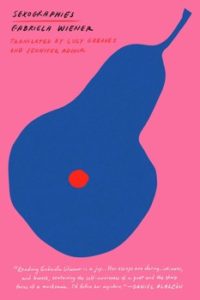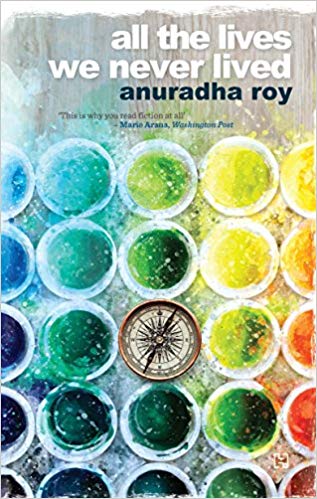
According to the biography posted online renowned Peruvian journalist Gabriela Wiener (Lima, 1975) is author of the collections of crônicas Sexografías, Nueve Lunas, and Mozart, la iguana con priapismo y otras historias. Her work also includes the poetry collection Ejercicios para el endurecimiento del espíritu. Her latest book is Llamada perdida (2014). She writes regularly for the newspapers El Pais(Spain) and La República (Perú). She also writes for several magazines of America and Europe, such as Etiqueta Negra (Perú), Anfibia (Argentina), Il corriere della Sera (Italy), S. XXI (France), and Virginia Quarterly Review (United States). In Madrid, she worked as editor of the Spanish edition of Marie Claire. She left the magazine in 2014 to work on her first novel.
Restless Books will be publishing Sexographies in May 2018. It has been translated from the Spanish by Jennifer Adcock and Lucy Greaves. This is a form of reportage that is like none other. A collection of brutal essays written in the first person that are impossible to classify in any genre. The writing breaks all known norms. It is perhaps preferable to say that the focus of every essay determines the style of writing whether it is “infiltrating the most dangerous Peruvian prison, participating in sexual exchanges in swingers clubs, traveling the dark paths of the Bois de Boulogne in Paris in the company of transvestites and prostitutes, undergoing a complicated process of egg donation in Spain, and participating in a ritual of ayahuasca ingestion in the Amazon jungle“. A truer book blurb was never written when Sexographies is described as “an eye-opening, kamikaze journey across the contours of the human body and mind”.
Included in Sexographies is Gabriela Wiener’s profile of Isabel Allende. It is a brilliantly illuminating conversation-cum-profile of an older woman writer. Isabel Allende is almost venerated by the younger one, Gabriela Wiener, and yet they are able to understand each other as individuals, women, and writers. They meet on International Women’s Day. Gabriela Wiener notes that “Bolano called her an escribidora — a prolific and bad writer. Making fun of Isabel Allende isn’t a sign of intelligence, it’s part of Latin American literary folklore.” She goes on to observe that “The novelist, after all, is a traditional woman who was brought up to be a good girl, and who worked to free herself through literature.” Meanwhile Isabel Allende acknowledges that she has a fair amount of criticism hurled at her but she takes it in her stride as she takes her success. She realises she is often under the critical scanner for the simple fact “I sell books.” Isabel Allende’s life’s philosophy is to strike a balance between frivolity and depth; she says “Since then I haven’t stopped being feminine, sexy, and a feminist. It can be done.”
Here is an excerpt from the essay “Isabel Allende Will Keep Writing from the Hereafter”published with the permission of Restless Books. ( Publication date: May 15, 2018. Contact Nathan Rostron, Editor and Marketing Director: [email protected] )
*******
Allende is an easy target for the canonizers of novels. It’s possible that not many of her critics are willing to admit that the virulence of their attacks are based on prejudice: she’s an upper- class woman who used to write a feminist column for a fashion magazine in the 1970s. At the age of forty, without any academic training, she started publishing novels, made autobiographical fiction her signature, and her books started flying off supermarket shelves. In a world where the stupidest things tend to be the most popular, sales of fifty million copies can only arouse suspicion.
But put yourself in her shoes: try having the surname Allende in Chile, going into exile, getting divorced, bringing up children, dedicating yourself to journalism, and writing novels. She was part of a generation of Latin American women who juggled all these things at once, and yet managed to triumph under the long shadow of the Boom—a movement that didn’t really contain a single woman writer, only incredibly loving wives who kept everything nice and comfortable so that their husbands could finish their books and win that Nobel Prize.
Try writing from the bottom tip of the American continent about emotions and sex instead of tunnels and labyrinths. Now try to sustain a literary career over three decades with unwavering success. Try, moreover, to produce as many well-written novels as she has. Because Isabel Allende’s books are well-written: there is a voice and an imagination. Isabel Allende builds her stories around simplicity. She occasionally succumbs to cheapness, lace, and frills, but her expression is founded on the richness of family stories, everyday comedy and drama, and the intimate knowledge of a feminine universe, as in The House of the Spirits. In Eva Luna or The Infinite Plan, being colloquial and inventive makes her prose even more personal and confessional. Her books reveal history through memory and reclaim sex so that it belongs to the home and not to poets of the body. In Paula, perhaps the best of her books, she describes a man’s suffering in the presence of his comatose daughter’s body. In it, the consciousness of being human reaches levels that Allende’s language cannot match.
We know the outcome of Allende’s adventure: few have built such a solid relationship with their readers, a relationship based on something mysterious and addictive that they find in her pages and which defies any logic outside itself. Isabel Allende isn’t Virginia Woolf, she’s not Clarice Lispector, and she’s not Alice Munro; but neither is she a bestseller à la Dan Brown with his simple-minded esoteric vision of the crime novel. And yet he isn’t criticized half as often as she is.
What’s the sell-by date of a popular writer after the publication of their last hit? At this women-only conference I’ve heard names I hadn’t heard for years: Laura Esquivel and Ángeles Mastretta, for example. And the first thing I thought was “they’re still alive?” Yesterday I saw Mastretta, the author of commercial bombshells such as Tear This Heart Out and Lovesick, gliding down the corridors of the Palacio de Bellas Artes with her dramatic cheekbones, her carefully coiffed hair, and her fragile movements, and it was like stepping back into the eighties. On Wikipedia, I discover that she’s carried on publishing books. In the last two decades of the twentieth century, the books of these three women were labeled “women’s literature,” a kind of derivation of “true literature” with sugary, sentimental additives of which Allende is the highest-profile proponent. Following its initial golden years, “women’s literature” seems to have fallen out of favor, and Allende alone has remained a bestseller. After the success of Like Water for Chocolate, Esquivel took refuge in a mansion in the outskirts of Mexico City, tried out being a member of parliament, and now facilitates workshops and publishes books in the style of 12 Steps to Happiness. Years after that enormous cocoa feast, Allende wrote her own book about sex and cocaine: Aphrodite, a book where cooking recipes lead to love (also known as the kind of book that immediately banishes you from the annals of literature with a capital L).
Gabriela Wiener Sexographies ( translated by Lucy Greaves and Jennifer Adcock) Restless Books, Brooklyn, 2018. Pb. pp.
2 May 2018



















